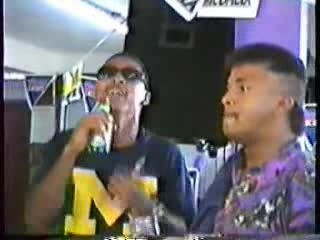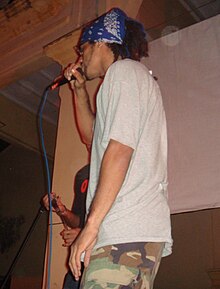
Luis Armando Lozada Cruz, known by his stage name Vico C, is an American rapper, singer and record producer. Regarded as the founding father of reggaeton, Vico C has played an influential role in the development of Latin American hip hop and urban music.
The music of Cuba, including its instruments, performance, and dance, comprises a large set of unique traditions influenced mostly by west African and European music. Due to the syncretic nature of most of its genres, Cuban music is often considered one of the richest and most influential regional music in the world. For instance, the son cubano merges an adapted Spanish guitar (tres), melody, harmony, and lyrical traditions with Afro-Cuban percussion and rhythms. Almost nothing remains of the original native traditions, since the native population was exterminated in the 16th century.

Reggaeton, is a modern style of popular and electronic music that originated in Panamá during the late 1980s, and which rose to prominence in the late 1990s and early 2000s through a plethora of Puerto Rican musicians. It has evolved from dancehall, with elements of hip hop, Latin American, and Caribbean music. Vocals include toasting/rapping and singing, typically in Spanish.
Hip hop music arrived in Cuba via radio and TV broadcasts from Miami. During the 1980s hip hop culture in Cuba was mainly centered on breakdancing. But by the 1990s, with the collapse of the Soviet Union and the onset of the Special Period, young raperos, exposed to foreign tourists whose wealth highlighted their struggle, turned to rapping to affirm their cubanidad and advocate for further revolutionary reforms.

The Cuba national football team represents Cuba in men's international football, and is controlled by the Football Association of Cuba. Nicknamed Leones del Caribe, the team represents all three FIFA, Caribbean Football Union and Confederation of North, Central American and Caribbean Association Football (CONCACAF).

Pablo Milanés Arias was a Cuban guitar player and singer. He was one of the founders of the Cuban nueva trova, along with Silvio Rodríguez and Noel Nicola. His music, originating in the Trova, Son and other traditional styles of early 20th Century Cuban music, set him apart from the style of Silvio Rodríguez.

Pablo Rodríguez Lozada, better known as Tito Rodríguez, was a Puerto Rican singer and bandleader. He started his career singing under the tutelage of his brother, Johnny Rodríguez. In the 1940s, both moved to New York, where Tito worked as a percussionist in several popular rhumba ensembles, before directing his own group to great success during the 1950s. His most prolific years coincided with the peak of the mambo and cha-cha-cha dance craze. He also recorded boleros, sones, guarachas and pachangas.
Cubanito, also known by the former name Cubanito 20.02, is a Cuban reggaeton/cubaton band. The band is credited, along with the band Máxima Alerta, with popularizing cubaton, though Cubanito is influenced more by Jamaican music, whereas Máxima Alerta is influenced more by traditional Cuban music.
Roberto Juan Diago y Querol was a Cuban artist specializing in photography, engraving, painting and drawing.

Buena Fe is a pop music band from Cuba, formed in 1999 in the province of Guantánamo, initially composed only of Israel Rojas Fiel and Yoel Martínez Rodríguez. They have released ten studio albums: Déjame entrar (2001), Arsenal (2003), Corazonero (2004), Presagios (2006), Catalejo (2008), Pi (3,14) (2010), Dial (2013), Soy (2015), Sobreviviente (2017) and Carnal (2019).

Macarena Gómez Traseira is a Spanish actress. She became known for her many roles in fantasy and horror films. From 2007 to 2020, she played the iconic role of Lola in the television series La que se avecina.

Manuel del Socorro Rodríguez was a Cuban journalist. He is considered to be the founder of journalism in Colombia. Five years before his arrival in the Viceroyalty of New Granada, the 1785 Viceroyalty of New Granada earthquake had happened, described in the Aviso del Terremoto and published the day of the earthquake. This sparked the birth of journalism in Colombia, when Del Socorro started to report in 1791.
"Inolvidable" ("Unforgettable") is a song written by Julio Gutiérrez in 1944. It is considered one of the most popular boleros released during the Cuban musical movement led by pianists. The song has been recorded by several performers, including Roberto Carlos, Diego El Cigala, Fania All-Stars, Eydie Gormé, Danny Rivera, Tito Rodríguez and Bebo Valdés, among others.
Roberto Juan Rodríguez (Havana) is a Cuban-American jazz musician who is known for fusion of Latin music and Jewish Klezmer elements. Although not Jewish his father's Latin band regularly played at Jewish theatre, weddings and bar mitzvahs in Miami, giving the young percussionist an interest in Jewish music. In the 1980s he moved to New York, recording with Marc Ribot, as the drummer for Ribot's Los Cubanos Postizos, and John Zorn.

This is a list of notable events in Latin music that took place in 2015.

Andy Baquero Ruiz is a Cuban professional footballer who plays for Vaughan Azzurri in League1 Ontario. He previously played for the Cuba national team and Cuba national futsal team until his defection in 2019. He plays as a midfielder and a right back.
This article includes an overview of the major events and trends in Latin music in the 1970s, namely in Ibero-America. This includes recordings, festivals, award ceremonies, births and deaths of Latin music artists, and the rise and fall of various subgenres in Latin music from 1970 to 1979.
Edwin "Eddie" Montalvo is an American percussionist and bandleader of Puerto Rican descent. Born and raised in the Bronx, he best known for playing the Congas for Hector Lavoe, Rubén Blades as well as with the Fania All-Stars.










